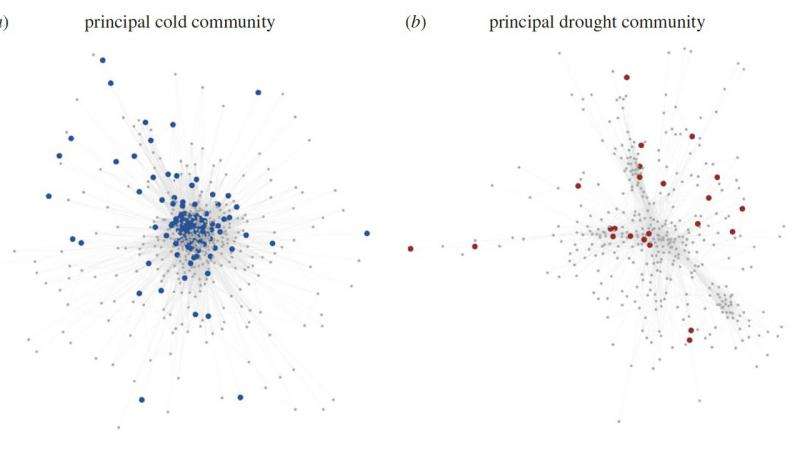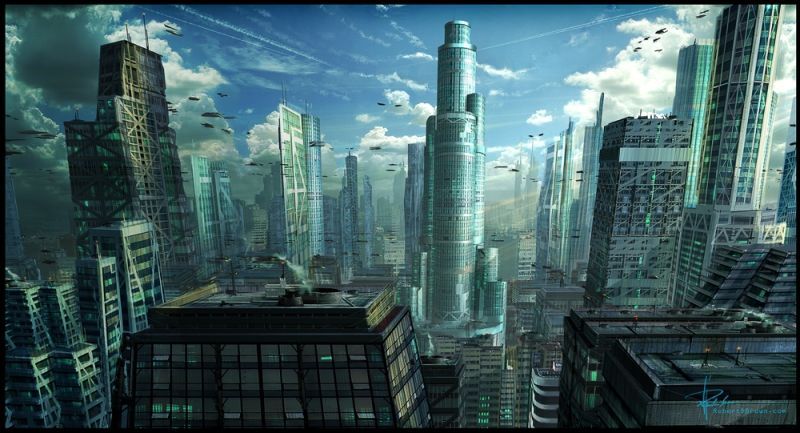“Understanding interactions between different gene networks, which are evolved to respond to different stressors, and understanding natural variation in these responses could have important agricultural applications in challenging environments.”


“Understanding interactions between different gene networks, which are evolved to respond to different stressors, and understanding natural variation in these responses could have important agricultural applications in challenging environments.”

Superlubricity nano-structured self-assembling coating repairs surface wear, decreases emissions and increases HP and gas mileage.
Globally about 15 percent of manmade carbon dioxide comes from vehicles. In more developed countries, cars, trucks, airplanes, ships and other vehicles account for a third of emissions related to climate change. Emissions standards are fueling the lubricant additives market with innovation.
Up to 33% of fuel energy in vehicles is used to overcome friction. Tribology is the science of interacting surfaces in relative motion inclusive of friction, wear and lubrication. This is where TriboTEX, a nanotechnology startup is changing the game of friction modification and wear resilience with a lubricant additive that forms a nano-structured coating on metal alloys.
This nano-structured coating increases operating efficiency and component longevity. It is comprised of synthetic magnesium silicon hydroxide nanoparticles that self-assemble as an ultralow friction layer, 1/10 of the original friction resistance. The coating is self-repairing during operation, environmentally inert and extracts carbon from the oil. The carbon diamond-like nano-particle lowers the friction budget of the motor, improving fuel economy and emissions in parallel while increasing the power and longevity of the motor.
TriboTEX has a Kickstarter campaign that has just surpassed $100,000 in funding. The early bird round has just closed that offered the product at one half the cost of its retail. The final round offers the lubricant system self-forming coating at 75 percent and is ending shortly. The founder Dr. Pavlo Rudenko, Ph.D. is a graduate of Singularity University GSP11 program.
“Launched in 2007, the Fuller Challenge has defined an emerging field of practice: the whole systems approach to understanding and intervening in complex and interrelated crises for wide-scale social and environmental impact. The entry criteria have established a new framework through which to identify and measure effective, enduring solutions to global sustainability’s most entrenched challenges. The rigorous selection process has set a unique standard, gaining renown as “Socially-Responsible Design’s Highest Award.”
The Fuller Challenge attracts bold, visionary, tangible initiatives focused on a well-defined need of critical importance. Winning solutions are regionally specific yet globally applicable and present a truly comprehensive, anticipatory, integrated approach to solving the world’s complex problems.”
Deadline is March 31, 2017

Recent evidence suggests that a variety of organisms may harness some of the unique features of quantum mechanics to gain a biological advantage. These features go beyond trivial quantum effects and may include harnessing quantum coherence on physiologically important timescales.


“An increasing number of US landowners want to build commune-style villages that are completely self-sufficient and have a low carbon footprint”
“Appearances have always played a much more important part than reality in history, where the unreal is always of greater moment than the real.“
–Gustav LeBon, The Crowd (1895)
I’ve gotten no substantive response to my last post on vaccine safety– neither in the comments, nor the TruthSift diagram, nor anywhere else, nor have the papers I submitted to two medical journals… but I have gotten emails telling me I’m delusional and suggesting I seek psychiatric attention. And this of course is integral to the explanation of how such delusions as vaccine safety persist so widely when it is so demonstrably a delusion: the majority who believe the majority must be right because its the majority are emotionally unwilling to confront the evidence. They assume the experts have done that, and they rely on the experts. But the experts assume other experts have been there. Ask your Pediatrician if he’s personally read Bishop et al and formulated an opinion on vaccine aluminum. Neither has the National Academy, except perhaps their members have and decided, perhaps tacitly, not to review the subject. Their decision not to review the animal literature was not tacit, they said they explicitly decided to omit it, although elsewhere they say they couldn’t find human evidence that addressed the issues. So everybody is trusting somebody else, and nobody has picked up the ball. And can you blame them? Because when I pick up the ball, what I receive in return is hate mail and people’s scorn. The emotional response cuts off any possible inspection of the logic.
On most questions where a majority with authority is facing a minority of dissenters or skeptics, the majority is delusional.
In other words, you are living in the matrix; much of what you and people believe is fundamentlaly wrong.
Reason 1, as above, is that the majority forms its view by circular reasoning, and rejects any attempt at logical discussion without considering it seriously, so it is prone to delusion.
Once the crowd concluded vaccines are safe and effective, for example, the question of whether the aluminum is damaging can apparently no longer be raised (even as more gets added to vaccines). And when I or others try to raise it, we are scorned and hated, and ineffectual in changing the opinion supported by circular reasoning. When new research papers appear that call it into question, they are ignored, neither cited in the safety surveys nor influencing medical practice in any way. This paragraph is all simple reporting of what has repeatedly happened.
Reason 2 is a minority wouldn’t be holding out without a good reason, because they are punished for their opposition with scorn and hatred at least. Except perhaps for explicitly religious issues, the usual reason they are so stubborn is they are defending rational truth.
Reason 3 is there’s often big money to be made or political power to be gained by influencing the majority opinion, and experts given good budgets appear to be pretty good at influencing majority opinion, especially with the aid of mass media, covertly staged stunts, and in many areas time enough to have long ago started from kids and education. On the other hand, rationality and reality don’t usually have press agents or forward looking media strategies, and there’s little or no money in swaying the minority position.
Show me a question with a majority with authority facing a minority where the majority isn’t delusional, and I’ll show you a minority that’s being paid under the table or planted to discredit rationalists in other controversial areas. At least I’ll suggest you strongly consider that as an alternative theory of what you see. The only one I can think of off hand are flat-earthers.
Mass Delusions were famously studied in 19th century first by Charles Mackay in
Popular Mass Delusions and the Madness of Crowds (1852) but more interestingly IMO in Gustave Le Bon, (1895) The Crowd. This latter was arguably the single book that had the most influence on the shape of the twentieth century. By their own accounts “The Crowd” was on Theodore Roosevelt’s bedside table, and dogeared by Mussolini. Lenin and Stalin took from it, and “Hitler’s indebtedness to Le Bon bordered on plagiarism” in the words of historian and Hitler-biographer Robert G. L. Waite. Sigmund Freud wrote a book discussing Le Bon, and Freud’s nephew Edward Bernays, acknowledged his deep debt, as Goebbels did of Bernays’ reflected insights.
Bernays equally isn’t as widely known as he should be. He invented the field of public relations, the “panel of doctors”, the slogan “making the world safe for democracy”, the diamond engagement ring, broke the taboo on women’s smoking and practically doubled sales by recruiting protesters smoking “torches of freedom”, bacon and eggs, and flouridated water, among many other things. There weren’t any decent safety studies on fluoridated water, and some modern studies say its taking multiple IQ points off the population, and nations and regions that don’t fluoridate have just as good teeth today as nations and regions that do, and putting fluoride in mouthwash and toothpaste rather than the drinking water would plainly have made a lot more sense from the point of view of public safety and health, but one thing you can count on: once he put it in the water supply and convinced everybody it was a health measure, you couldn’t sue for damage from fluoride runoff any more, and potentially multi-asbestos scale class action suits against the Government and aluminum manufacturers disappeared. Since Bernays got done, just raising the issue of fluoride gets you branded fruitcake and shunned to this day.
They are also still “making the world safe for democracy”, which he coined for WW1. But is this what they are doing, or is that another widely held delusion?
Bernays also wrote the book Propaganda which begins: “The conscious and intelligent manipulation of the organized habits and opinions of the masses is an important element in democratic society. Those who manipulate this unseen mechanism of society constitute an invisible government which is the true ruling power of our country.”
I’ve quoted from and summarized and discussed Le Bon extensively before so I will give only a brief flavor here.
“It is not necessary that a crowd should be numerous for the faculty of seeing what is taking place before its eyes to be destroyed and for the real facts to be replaced with hallucinations unrelated to them….
“To return to the faculty of observation possessed by crowds, our conclusion is that their collective observations are as erroneous as possible, and that most often they merely represent the illusion of an individual who, by a process of contagion, has suggestioned his fellows.”
“The events with regard to which there exists the most doubt are certainly those which have been observed by the greatest number of persons. To say that a fact has been simultaneously verified by thousands of witnesses is to say, as a rule, that the real fact is very different from the accepted account of it.”…
“By the mere fact that an individual forms part of a crowd, his intellectual standard is immediately and considerably lowered….
“The inferior reasoning of crowds is based, just as is the reasoning of a high order, on the association of ideas, but between the ideas associated by crowds there are only apparent bonds of analogy or succession. The mode of reasoning of crowds resembles that of the Esquimaux who, knowing from experience that ice, a transparent body, melts in the mouth, concludes that glass, also a transparent body, should also melt in the mouth…
The characteristics of the reasoning of crowds are the association of dissimilar things possessing a merely apparent connection between each other, and the immediate generalization of particular cases. It is arguments of this kind that are always presented to crowds by those who know how to manage them. They are the only arguments by which crowds are to be influenced. A chain of logical argumentation is totally incomprehensible to crowds…”
“When these convictions [of crowds] are closely examined,…, it is apparent that they always assume a particular form which I can not better define than giving it the name of a religious sentiment…
Intolerance and fanatacism are the necessary accompaniments of the religious sentiment. They are inevitably displayed by those who believe themselves in the possession of the secret of earthly or eternal happiness. These two characteristics are to be found in all men grouped together when they are inspired by a conviction of any kind. The Jacobins of the Reign of Terror were at bottom as religious as the Catholics of the Inquisition, and their cruel ardour proceeded from the same source. The convictions of crowds assume those characteristics of blind submission, fierce intolerance, and the need of violent propaganda which are inherent in the religious sentiment, and it is for this reason that it may be said that all their beliefs have a religous form.
Whether the feelings exhibited by a crowd be good or bad, they present the double character of being very simple and very exaggerated… a throng knows neither doubt nor uncertainty.”
The Red pill
So, now what’s in the red pill? Why, its a placebo. You can use any old red jelly bean. But if you swallow it and believe that the majority may be totally delusional about anything, and start looking into practically any subject with dissenters with an open mind, then I predict if you are skilled at critical thinking, you will shortways find the majority is in fact delusional, that is, you are indeed living in the matrix.
Much more widely than you are likely to imagine. For example, the news is basically propaganda, in lockstep among all the mainstream media, who accept whatever the government and political correctness tells them to believe uncritically. Was the passenger plane over Ukraine brought down by missile or strafing? Did the CDC conspire to hide a vaccine autism connection? Is the congress being run behind the scenes by a uniparty? You won’t find any of those subjects discussed unless to whitewash in the US mainstream media. What you want in a media system is ostensible diversity that conceals an actual uniformity. –Joseph Goebbels The history books are no better, as Le Bon observed. The banking system is all based on smoke and mirrors and a healthy skim. Etc.
I don’t expect TruthSift.com to convince the masses they are delusional, because Le Bon assures me logic will never sway a crowd, but I offer it as a tool to shortcut a lot of work for those who swallow the red pill. Rather than having to study a field in detail for years as I have with vaccines and needing to be able to supply PhD level understanding of what you are reading and needing the confidence of your convictions against the many, you can much more rapidly peruse a diagram and find what the real situation is, assuming the diagram has been created and debated.
So I beg readers here to create such diagrams on TruthSift for any topic you are interested in.
Of course, they are fun and interesting too.
I also commend TruthSift to corporations and others wanting to escape the kind of crowd think delusions so well characterized by Le Bon, and achieve actual rationality in your decisions. Use it on Private Diagrams. Everybody in your organization will be able to contribute to the document, if you invite them, exactly where its pertinent. It will naturally divide and conquer your problems in ways where different people can address different problems, achieving true collaboration. Nobody will be able to get confused or pursue some other agenda without being transparently refereed. The answer will be far more rationally derived and argued for than what you are doing now. You can allow people to contribute under pseudonyms if you want. http://TruthSift.com

The growth of human and computer intelligence has triggered a barrage of dire predictions about the rise of super intelligence and the singularity. But some retain their skepticism, including Dr. Michael Shermer, a science historian and founding publisher of Skeptic Magazine.
The reason so many rational people put forward hypotheses that are more hype than high tech, Shermer says, is that being smart and educated doesn’t protect anyone from believing in “weird things.” In fact, sometimes smart and educated people are better at rationalizing beliefs that they hold for not-so-rational reasons. The smarter and more educated you are, the better able you are to find evidence to support what you want to be true, suggests Shermer.
“This explains why Nobel Prize winners speak about areas they know nothing about with great confidence and are sure that they’re right. Just because they have this great confidence of being able to do that (is) a reminder that they’re more like lawyers than scientists in trying to marshal a case for their client,” Shermer said. “(Lawyers) just put together the evidence, as much as you can, in support of your client and get rid of the negative evidence. In science you’re not allowed to do that, you’re supposed to look at all the evidence, including the counter evidence to your theory.”
The root of many of these false hypotheses, Shermer believes, is based in religion. Using immortality as an example, Shermer said the desire to live forever has strong parallels to religious beliefs; however, while there are many making prophecies that technology will insure we’ll live forever, too many people in groups throughout history have made similar yet unfulfilled promises.
“What we’d like to be true is not necessarily what is true, so the burden of proof is on them to go ahead and make the case. Like the cryonics people…they make certain claims that this or that technology is going to revive people that are frozen later…I hope they do it, but you’ve got to prove otherwise. You have to show that you can actually do that.”
Even if we do find a way to live forever, Shermer notes the negatives may outweigh the positives. It’s not just living longer that we want to achieve, but living longer at a high quality of life. There’s not much benefit in living to age 150, he adds, if one is bedridden for 20 or 30 years.
Instead, Shermer compares the process to the evolution of the automobile. While the flying cars promised by 1950’s-era futurists haven’t come to pass, today’s automobile is exponentially smarter and safer than those made 50 or 60 years ago. While forward thinkers have had moments of lucid foresight, humans also have a history of making technology predictions that often don’t turn out to be realized. Often, as is the case with the automobile, we don’t notice differences in technological changes because the changes happen incrementally each year.
“That’s what’s really happening with health and longevity. We’re just creeping up the ladder slowly but surely. We’ve seen hip replacements, organ transplants, better nutrition, exercise, and getting a better feel for what it takes to be healthy,” Shermer says. “The idea that we’re gonna’ have one big giant discovery made that’s going to change everything? I think that’s less likely than just small incremental things. A Utopian (society) where everybody gets to live forever and they’re infinitely happy and prosperous and so on? I think it’s unrealistic to think along those lines.”
Looking at the future of technology, Shermer is equally reticent to buy in to the predictions of artificial intelligence taking over the world. “I think the concern about AI turning evil (and) this dystopian, science fiction perspective is again, not really grounded in reality. I’m an AI optimist, but I don’t think the AI pessimists have any good arguments,” Shermer said
While we know, for the most part, which types of governments work well, we don’t have any similar precedent for complex AI systems. Humans will remain in control and, before we start passing laws and restrictions to curb AI out of fear, Shermer believes we should keep improving our computers and artificial intelligence to make life better, evaluating and taking action as these systems continue to evolve.

“What is the best way to get from A to B by public transit? Google Maps is answering such queries for over 20,000 cities and towns in over 70 countries around the world, including large metro areas like New York, São Paulo or Moscow, and some complete countries, such as Japan or Great Britain.”

In professional cycling, it’s well known that a pack of 40 or 50 riders can ride faster and more efficiently than a single rider or small group. As such, you’ll often see cycling teams with different goals in a race work together to chase down a breakaway before the finish line.
This analogy is one way to think about collaborative multi-agent intelligent systems, which are poised to change the technology landscape for individuals, businesses, and governments, says Dr. Mehdi Dastani, a computer scientist at Utrecht University. The proliferation of these multi-agent systems could lead to significant systemic changes across society in the next decade.
Image credit: ResearchGate“Multi-agent systems are basically a kind of distributed system with sets of software. A set can be very large. They are autonomous, they make their own decisions, they can perceive their environment, “Dastani said. “They can perceive other agents and they can communicate, collaborate or compete to get certain resources. A multi-agent system can be conceived as a set of individual softwares that interact.”
As a simple example of multi-agent systems, Dastani cited Internet mail servers, which connect with each other and exchange messages and packets of information. On a larger scale, he noted eBay’s online auctions, which use multi-agent systems to allow one to find an item they want to buy, enter their maximum price and then, if needed, up the bid on the buyer’s behalf as the auction closes. Driverless cars are another great example of a multi-agent system, where many softwares must communicate to make complicated decisions.
Dastani noted that multi-agent systems dovetail nicely with today’s artificial intelligence. In the early days of AI, intelligence was a property of one single entity of software that could, for example, understand human language or perceive visual inputs to make its decisions, interact, or perform an action. As multi-agent systems have been developed, those single agents interact and receive information from other agents that they may lack, which allows them to collectively create greater functionality and more intelligent behavior.
“When we consider (global) trade, we basically define a kind of interaction in terms of action. This way of interacting among individuals might make their market more efficient. Their products might get to market for a better price, as the amount of time (to produce them) might be reduced,” Dastani said. “When we get into multi-agent systems, we consider intelligence as sort of an emergent phenomena that can be very functional and have properties like optimal global decision or situations of state.”
Other potential applications of multi-agent systems include designs for energy-efficient appliances, such as a washing machine that can contact an energy provider so that it operates during off-peak hours or a factory that wants to flatten out its peak energy use, he said. Municipal entities can also use multi-agent systems for planning, such as simulating traffic patterns to improve traffic efficiency.
Looking to the future, Dastani notes the parallels between multi-agent systems and Software as a Service (SaaS) computing, which could shed light on how multi-agent systems might evolve. Just as SaaS combines various applications for on-demand use, multi-agent systems can combine functionalities of various software to provide more complex solutions. The key to those more complex interactions, he added, is to develop a system that will govern the interactions of multi-agent systems and overcome the inefficiencies that can be created on the path toward functionality.
“The idea is the optimal interaction that we can design or we can have. Nevertheless, that doesn’t mean that multi-agent systems are by definition, efficient,” Dastani said. “We can have many processes that communicate, make an enormous number of messages and use a huge amount of resources and they still can not have a sort of interesting functionality. The whole idea is, how can we understand and analyze the interactions? How can we decide which interaction is better than the other interactions or more efficient or more productive?”